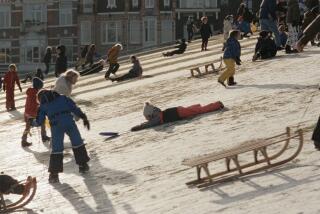Epilogue: Berlin
- Share via
THROUGH TIMES OF inspiring artistry and unspeakable evil, this leafy city on the Spree River has been at center stage for many of Europe’s great 20th century dramas.
Drafting board for two world wars, seat of the doomed Weimar Republic, nerve center for the Holocaust and Communist dictators, and front line for the Cold War, Berlin carries staggering historical baggage into its new role as the heart of a mended Germany and an integrating Europe.
Once more the German capital, the city has emerged economically stronger and politically wiser than any other in the former Eastern Bloc.
Six decades of dictatorship and division took an irreparable toll on Berlin. Industry and commerce fled to Munich, Hamburg and Frankfurt. But the city’s diminution may help transform it into a stable 21st century metropolis, draping a mantle of modesty over the restored physical grandeur that might otherwise evoke memories of its domineering past.
The imposing Reichstag, home to parliament, has been crowned with a glass cupola signifying the power structure’s openness to the people. Mirrored office towers and sleek shopping arcades at Potsdamer Platz, which the Berlin Wall had sealed into a dead zone, are drawing life and commerce back to the geographic core of the city. Even the formidable Brandenburg Gate, which once flaunted the martial prowess of the kaisers, seems less forbidding amid cheerful cafes, graceful embassies and boutiques.
It is a city that few have aspired to emulate. But in the post-Communist era of outsize dreams and dashed expectations, it now serves as a symbol of hope for those still struggling to reform societies ravaged by tyranny and corruption.
For much of Eastern Europe, the revolutions are far from over, even if the passion for change has receded.
“No one, no matter how disillusioned, can imagine there being a new Iron Curtain. The fights are about policy and pace and priorities, not a longing for the times of division,” says Richard Schroeder, a religious and cultural leader from eastern Germany who serves as vice president of Humboldt University.
“I’m happy that, nowadays, people can do what they should have been allowed to do in any reasonable society--read what they want, believe what they want and go where they want,” says the professor.
Throwing off the yoke of communism has encouraged the reemergence of nation states--sometimes peacefully, as with the Czech and Slovak republics, but also with shocking brutality, as in the Balkans.
New boundaries being etched in the east are likely to blur as the European Union spreads and as newly liberated countries delegate some power to the bloc’s hierarchy in Brussels.
While disappointment is widespread over the slow improvement in living standards, the current dissatisfaction may be as much a facet of human nature as is the forgotten euphoria of revolution.
“I wonder if you really can change your degree of happiness in life,” ponders Michael Steiner, a diplomat who spent his career in the Eastern Bloc and is now chief foreign policy advisor to Chancellor Gerhard Schroeder. “There really was joy 10 years ago, and people have a lot to be happy about now. So the question is, why aren’t they?”
More to Read
Sign up for Essential California
The most important California stories and recommendations in your inbox every morning.
You may occasionally receive promotional content from the Los Angeles Times.














